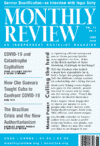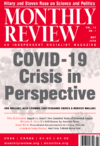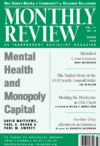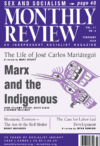
The good-for-business wars
A new poem by Marge Piercy. | more…

A new poem by Marge Piercy. | more…

A new poem from Marge Piercy. | more…

In its wider economic, ecological, epidemiological, and public health context, the current COVID-19 pandemic demonstrates the enormous dangers of the metabolic rift in human ecology and epidemiology brought on by capitalist social relations in the age of monopoly-finance capital, global agribusiness, and intricate, globe-spanning supply chains associated with the extreme exploitation and expropriation of both human beings and nature. Neoliberalism, representing the inner logic of capitalism, has left the world vulnerable to catastrophe wherever it has come into play. | more…

COVID-19, the illness caused by coronavirus SARS-CoV-2, the second severe acute respiratory syndrome virus since 2002, is now officially a pandemic. As of late March, whole cities are sheltered in place and, one by one, hospitals are lighting up in medical gridlock brought about by surges in patients. | more…
The climate crisis is proving to be antithetical to the neoliberal machines that define current forms of social organization. Reducing fossil fuel consumption, the largest contributor to climate change, requires collaborative efforts. These efforts must take into consideration the foundational role of fossil fuels in modern economies. Yet, renewables lack many of the characteristics that have made fossil fuels so desirable in production processes, limiting their ability to expropriate human labor. At the same time, climate catastrophes, such as wildfires and hurricanes, disrupt the infrastructural momentum of fossil fuel economies, destabilizing the mechanisms of capital accumulation that derive from the production and consumption of these fuels. All of these problems have come to a head in the recent crises in Chile and California. | more…

The main criticism leveled at the socialist economies was that a planned economy was inherently less efficient than a market one, due to the sheer scale of the bureaucratic task involved with planning a major economy. But the collapse of the Soviet and later the Russian economy under Mikhail Gorbachev and then Boris Yeltsin was an economic disaster that was otherwise unprecedented during times of peace. The world’s second superpower was reduced to the status of a minor bankrupt economy with a huge decline in industrial production and in living standards. | more…

According to the U.S. Bureau of Labor Statistics, the U.S. economy is experiencing an unemployment rate that is at a fifty-year low. Yet, wage growth continues to be weak, with continuing wage stagnation even at the peak of the business cycle. A major and largely undertheorized reason for the sluggish wages in a period of seeming full employment is to be found in the fact that the new jobs being created by the economy do not measure up to those of the past in terms of weekly wages and hours, or in the degree to which they support households or even individuals. | more…

Since the Great Financial Crisis of 2007–09, Hyman Minsky (1919–96) has been widely recognized as one of the late twentieth century’s most insightful economic theorists. Nevertheless, if Minsky had still been alive at the time of the Great Financial Crisis, there would have been little likelihood that his new-found reputation would have resulted in his receiving the Nobel Prize in Economics given his heterodox and socialist economic views. | more…

As an exposition of capitalism’s contradictions, Paul Baran and Paul Sweezy’s Monopoly Capital remains one of the most influential treatises in Marxist political economy produced in North America. Among Baran and Sweezy’s sociological investigations, they identified the negative consequences of capitalism for mental health, drawing attention to the manner in which the organization of capitalist society conflicted with the essential needs of the individual. | more…

When Paul Baran and Paul Sweezy’s Monopoly Capital was published by Monthly Review Press in 1966, two of the chapters originally drafted for the book were left out of the final volume: what was to have been Chapter 9 in the original plan for the book, entitled “Some Theoretical Implications,” and what was intended as Chapter 11, “The Quality of Monopoly Capitalist Society: Culture and Mental Health.” In July–August 2012, “Some Theoretical Implications” was finally published in Monthly Review. This was followed by the publication of the first part, approximately two-thirds of the whole, of “The Quality of Monopoly Capitalist Society: Culture and Mental Health,” titled “The Quality of Monopoly Capitalist Society: Culture and Communications,” in the July–August 2013 issue of the magazine. The section on mental health was left out on the grounds that it was incomplete. We finally publish it here. | more…

In the nineteenth century, Karl Marx, inspired by the German chemist Justus von Liebig, argued that capitalism’s relation to its natural environment was that of a robbery system, leading to an irreparable rift in the metabolism between humanity and nature. In the twenty-first century, these classical insights into capitalism’s degradation of the earth have become the basis of extraordinary advances in critical theory and practice associated with contemporary ecosocialism. In The Robbery of Nature, John Bellamy Foster and Brett Clark, working within this historical tradition, examine capitalism’s plundering of nature via commodity production, and how it has led to the current anthropogenic rift in the Earth System. | more…

According to the U.S. Bureau of Labor Statistics, the U.S. economy is experiencing an unemployment rate that is at a fifty-year low. Yet, wage growth continues to be weak, with continuing wage stagnation even at the peak of the business cycle. A major and largely undertheorized reason for the sluggish wages in a period of seeming full employment is to be found in the fact that the new jobs being created by the economy do not measure up to those of the past in terms of weekly wages and hours, or in the degree to which they support households or even individuals. | more…
Notifications